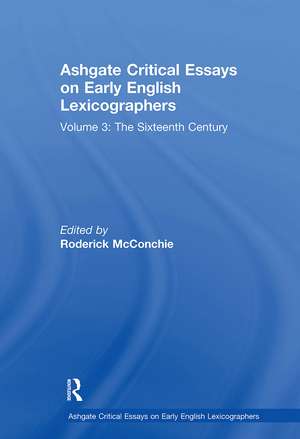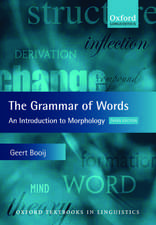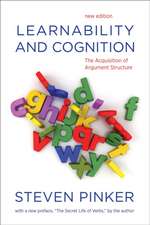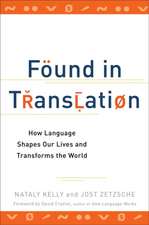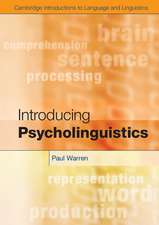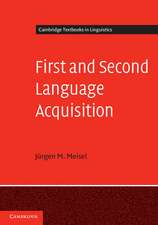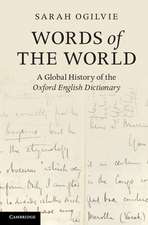Ashgate Critical Essays on Early English Lexicographers: Volume 3: The Sixteenth Century: Ashgate Critical Essays on Early English Lexicographers
Editat de Roderick McConchieen Limba Engleză Paperback – 14 oct 2024
| Toate formatele și edițiile | Preț | Express |
|---|---|---|
| Paperback (1) | 269.44 lei 6-8 săpt. | |
| Taylor & Francis – 14 oct 2024 | 269.44 lei 6-8 săpt. | |
| Hardback (1) | 1695.38 lei 6-8 săpt. | |
| Taylor & Francis – 16 iul 2012 | 1695.38 lei 6-8 săpt. |
Preț: 269.44 lei
Preț vechi: 316.33 lei
-15% Nou
Puncte Express: 404
Preț estimativ în valută:
51.56€ • 53.97$ • 42.66£
51.56€ • 53.97$ • 42.66£
Carte tipărită la comandă
Livrare economică 05-19 aprilie
Preluare comenzi: 021 569.72.76
Specificații
ISBN-13: 9781032919287
ISBN-10: 1032919280
Pagini: 496
Dimensiuni: 174 x 246 mm
Greutate: 0.92 kg
Ediția:1
Editura: Taylor & Francis
Colecția Routledge
Seria Ashgate Critical Essays on Early English Lexicographers
Locul publicării:Oxford, United Kingdom
ISBN-10: 1032919280
Pagini: 496
Dimensiuni: 174 x 246 mm
Greutate: 0.92 kg
Ediția:1
Editura: Taylor & Francis
Colecția Routledge
Seria Ashgate Critical Essays on Early English Lexicographers
Locul publicării:Oxford, United Kingdom
Public țintă
AcademicCuprins
Contents: Introduction; Part I General: Narrative and persuasion in early modern dictionaries and phrasebooks, John Considine; 'Dumb significants' and early modern English definition, Ian Lancashire; Doctors and dictionaries in 16th-century England, Roderick McConchie; English specialized lexicography in the late Middle Ages and in the Renaissance, Noel Edward Osselton; Bilingual dictionaries in Shakespeare's day, D.T. Starnes; The emerging role of English in the dictionaries of Renaissance Europe, Gabriele Stein; A footnote on the inkhorn controversy, James Sledd; Language helps for the Elizabethan tradesman, Louis B. Wright. Part II Latin-English: Definitions and first person pronoun involvement in Thomas Elyot's Dictionary, Gabriele Stein; The English of the 'Nomenclator', William A. Craigie; A note on 16th-century vernacular English, Don Cameron Allen; Thomas Thomas makes a dictionary, Allan Stevenson. Part III English-Latin: Richard Huloet as a recorder of the English lexicon, Gabriele Stein; Women and their world in Withal's Dictionary of 1553, Werner Hüllen; A note on the use of Renaissance dictionaries, James Sledd; John Baret's 'diligent bees', H. Rocke Robertson and Philip M. Teigen; Peter Levins' lexicographic approach, Roberta Facchinetti; The 'hard words' of Levins' dictionary, Maurizio Gotti. Part IV Familiar Vernacular: Law and early modern English lexicons, Ian Lancashire; Bilingual lexicography in the Renaissance: Palsgrave's English-French lexicon (1530), Douglas A. Kibbee; William Thomas: a forgotten clerk of the Privy Council, E.R. Adair; Claudius Hollyband and the earliest French-English dictionaries, Mark Eccles; Negotiating Florio's A Worlde of Wordes, David O. Frantz. Part V Unfamiliar Vernacular: The earliest list of Russian Lapp words, John Abercromby; Thomas Harriot (1560-1621) and the English origins of Algonkian linguistics, Vivian Salmon; Mark Ridley (1560-1624): an Elizabethan Slavist, Gerald Stone; Russian medical terminology in Mark Ridley's dictionary, Vera Fedorovna Konnova; The achievement of William Salesbury, Glanmor Williams; Index.
Notă biografică
Roderick McConchie is Lecturer in English at the University of Helsinki, Finland
Descriere
The sixteenth century in English lexicography formed a bridge between the glossarial compilations which had slowly evolved during the Middle Ages, and the more recognisably modern dictionary incorporating synonymy, illustrative citations and other standard features. The essays in this volume review the state of research in this field during the per
